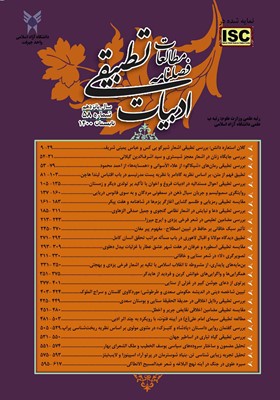بنمایههای پایداری، از مشروطه تا انقلاب اسلامی با تکیه بر اشعار فرخی یزدی و بهجتی
محورهای موضوعی : شعر
اکبر رنجبر
1
,
هادی حیدری نیا
2
*
![]() ,
محمود صادق زاده
3
,
محمود صادق زاده
3
1 - دانشجوی دکتری زبان و ادبیات فارسی ،واحد یزد ،دانشگاه آزاد اسلامی، یزد- ایران
2 - استادیار زبان وادبیات فارسی ،واحد یزد،دانشگاه آزاد اسلامی، یزد، ایران
3 - دانشیار زبان وادبیات فارسی ،واحد یزد،دانشگاه آزاد اسلامی، یزد، ایران
کلید واژه: بهجتی, ادب مقاومت, انقلاب مشروطه, فرخی, انقلاب اسلامی,
چکیده مقاله :
ادبیات پایداری، فریادِ رسای ملتهای مظلوم در برابر استعمار و حاکمان ظالم است. این نوع شعر هرچند در ادبیّات فارسی سابقه هزارساله دارد؛ ولی سرایش آن از زمان مشروطه به طور جدّی و هدفمند آغاز شد. شاعرانی چون فرخی در عصر مشروطیت و بهجتی در عصر انقلاب اسلامی از طلایه داران این عرصه بودند. با بررسی اجمالی سروده های شاعران مورد نظر می توان دریافت که این دو نسل از شاعران انقلابی از حیث اندیشه های سیاسی و اجتماعی نقاط اشتراک زیادی با هم دارند و مضامین ادبیات پایداری در سروده های آنها به وضوح مشاهده می شود. بنابراین، تحقیق در مضامین شعر این دو شاعر اهمیت دارد و بسیار ضروری می نماید. در این پژوهش تلاش شده است با روش توصیفی- تحلیلی، جلوه های پایداری را در اشعار این دو شاعر بررسی و به این سؤالات پاسخ داده شود؛ در حوزه مقاومت و پایداری چه مضامین و مؤلفههای مشترکی در اشعار فرخی و بهجتی میتوان مشاهده کرد؟ ویژگی های شعری این دو شاعر در حوزه پایداری چیست؟
The literature of stability is the loud cry of the oppressed nations against colonialism and oppressive rulers. Although this type of poetry has a thousand-year history in Persian literature; But its composition began seriously and purposefully from the time of the Constitution. Poets such as Farrokhi in the era of constitutionalism and Behjati in the era of the Islamic Revolution were among the pioneers in this field. An overview of the poems of the poets shows that these two generations of revolutionary poets have much in common in terms of political and social ideas, and the themes of sustainability literature can be clearly seen in their poems. Therefore, research on the poetic themes of these two poets is important and very necessary. In this research, it has been tried to study the effects of stability in the poems of these two poets by descriptive-analytical method and to answer these questions; In the field of resistance and stability, what common themes and components can be seen in Farrokhi and Behjati poems? What are the poetic characteristics of these two poets in the field of sustainability?
کتابنامه
اکبری، منوچهر. 1371ش، نقد و تحلیل ادبیّات انقلاب اسلامی، بخش اوّل، شعر، تهران: سازمان مدارک فرهنگی انقلاب اسلامی.
سپانلو، محمدعلی. 1369ش، چهار شاعر آزادی عارف، عشقی، بهار، فرخی یزدی، تهران: نگاه.
شفیعی کدکنی، محمدرضا. 1378ش، ادبیات فارسی از جامی تا روزگار ما، ترجمه حجت اله اصیل، تهران: نشر نی.
شیفعی کدکنی، محمدرضا. 1380ش، فراز و فرود ادبیات فارسی از انقلاب مشروطه تا انقلاب اسلامی، سایت مدومه.
علی بابایی، یحیی. 1383ش، عوامل مؤثر بر وحدت نخبگان، تهران: پژوهشکده امام خمینی ره و انقلاب اسلامی.
فرخی یزدی، محمد. 1382ش، دیوان اشعار، به کوشش حسین مکی، تهران: انتشارات امیرکبیر.
محمدی، غلامرضا. 1383ش، برهنه چون شمشیر، یزد: اندیشمندان یزد.
مسرت، حسین. 1384ش، پیشوای آزادی زندگی و شعر فرخی یزدی، تهران: ثالث.
یاحقی، محمد جعفر. 1385ش، چون سبوی تشنه، چ 1، تهران: انتشارات جامی.
مقالات
بهمنی، یدالله و علی پور طریفی. 1391ش، «تحلیل مقایسه مضامین برجسته شعر فرخی یزدی و عارف قزوینی»، تهران: پژوهشگاه علوم انسانی و مطالعات فرهنگی.
فدوی، طیبه و مسعود باران پوری. 1396ش، «مقایسه جلوههای ادبیات مقاومت در شعر علی فوده و فرخی یزدی»، مجله مطالعات ادبیات تطبیقی جیرفت، شماره44، صص71-101.
مدرسی، فاطمه. 1393ش، «جلوههای ادبیات پایداری در سرودههای فرخی یزدی»، نشریه ادبیات پایداری دانشگاه شهید باهنر کرمان، شماره10.
_||_Akbari, Manouchehr. 1992, Critique and Analysis of the Literature of the Islamic Revolution, Part I, Poetry, Tehran: Organization of Cultural Documents of the Islamic Revolution.
Spanloo, Mohammad Ali 1990, Four Poets of Freedom Aref, Eshghi, Bahar, Farrokhi Yazdi, Tehran: Negah.
Shafiee Kadkani, Mohammad Reza. 1999, Persian literature from Jami to our time, translated by Hojjatollah Asil, Tehran: Nashr-e Ney.
Shifai Kadkani, Mohammad Reza. 2001, The Rise and Fall of Persian Literature from the Constitutional Revolution to the Islamic Revolution, Madoumeh website.
Ali Babaei, Yahya 2004, Factors Affecting the Unity of Elites, Tehran: Imam Khomeini Research Institute and the Islamic Revolution.
Farokhi Yazdi, Mohammad 2003, Poetry Divan, by Hossein Maki, Tehran: Amirkabir Publications. Mohammadi, Gholamreza 2004, naked like a sword, Yazd: Yazd thinkers.
Masrat, Hussein 2005, Farrokhi Yazdi's Leader of Freedom of Life and Poetry, Tehran: Sales
Yahaqi, Mohammad Jafar 2006, Chun Sabuye Teshneh, V1, Tehran: Jami Publications.
Articles
Bahmani, Yadollah and Alipour Tarifi. 2012, "Analysis of Comparison of Prominent Themes of Farrokhi Yazdi and Aref Qazvini Poetry", Tehran: Institute of Humanities and Cultural Studies.
Fadavi, Tayyeba and Massoud Baranpour. 2017, "Comparison of the effects of resistance literature in the poetry of Ali Foudeh and Farrokhi Yazdi", Journal of Comparative Literature Studies of Jiroft, No. 44, pp. 71-101.
Modarressi, Fatemeh. 2014, "Effects of Sustainability Literature in Farrokhi Yazdi's Poems", Journal of Sustainability Literature, Shahid Bahonar University of Kerman, No. 10.

